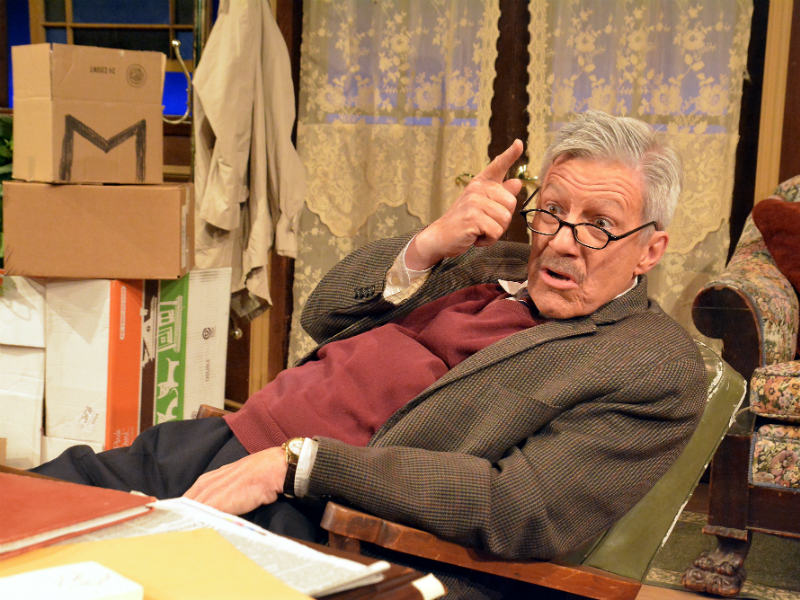Tom Dugan wrote, and stars in, the one man show, Wiesenthal (Nazi Hunter), which is playing at the Meridian Arts Centre in Toronto from Nov. 3 to 10. It’s a role he has recreated on stages throughout the United States, as well as in Winnipeg and Toronto, since it premiered in Los Angeles in 2009. He spoke to The CJN by phone from his home in L.A.
How’d a nice Irish Catholic boy like you end up playing an old Jewish man like Simon Wiesenthal?
I’ve always been interested in the Second World War. My father was a decorated Second World War veteran with a Purple Heart and a Bronze Battle Star. He liberated a concentration camp called Langentsein-Zwieberge. I grew up with stories of a 19-year-old witnessing the greatest of heroism meeting the greatest of cowardice.
I always wanted to do a play about the Second World War, then the Holocaust, but it wasn’t until reading Wiesenthal’s obituary that a light went on.
I’m also married to a Jewish woman and we’re raising two Jewish boys, Eli and Miles. I’m a welcome outsider in a Jewish world. There is a sense of living with “the other” within my very house. Wiesenthal’s message of tolerance really resonates.
Do you know any Holocaust survivors?
I’ve met hundreds of survivors. While researching the play, I interviewed many. It was the most important component of creating the character. I remember one particular survivor repeating the story of her horrendous life. I asked her, “How can you not cry?” She said, “It doesn’t matter if I cry or not. What matters is do you understand?” I was able to take that attitude into my performance as Wiesenthal.
As theatre, the play is both entertaining and enlightening. My goal is lofty, but I feel I’ve achieved it. Someone who knows everything there is to know about the Holocaust, as well as someone who knows nothing about the Holocaust, will both get something out of this show.
Where has Wiesenthal taken you?
So far, I’ve performed in about 30 states, starting in L.A., then the Midwest. Florida led to a big production on 42nd Street, which led to awards and PBS, which opened up a new world. This year, I’m hoping for Israel, in celebration of the opening of the Wiesenthal Centre in Tel Aviv. I’m also chomping at the bit for Europe. Other productions have played in Mexico, New Zealand and India. I’ve had calls with producers in L.A. and Israel about making a film.
Does audience reaction differ from city to city?
Lately, we’ve been targeting Jewish populations and enjoying crowded audiences. The themes are universal: tolerance, gratitude, justice. Improving society is the strength of Wiesenthal’s message. But I remember a performance in Davenport, Iowa. There was no synagogue within 200 miles of the theatre. Still, everyone responded to the story and the humour. (With the exception of one punchline, which used the Yiddish word “meshuggeneh.” You could have heard crickets in the audience.)
Is the show especially relevant today?
I don’t think Wiesenthal would be shocked. He understood, and one of the most important points of the play is, that the human savage is in all of us and will never go away. All we can do is contain him. Wiesenthal had a long view; he wouldn’t be shocked. Disappointed, maybe, at the pendulum swing. He was optimistic, as am I.
Do you feel a personal connection?
I had to delve into, and understand, all of it. The research weighed heavily on my soul. I remember sitting on the floor, holding my (then) little boys close and being grateful that they were born in an enlightened area and time. I appreciate on a personal level that thanks to Wiesenthal’s work, the world is a safer place.
You can’t back away from the horrors, but the play doesn’t get too graphic. You can’t make it so horrible that the audience stays away thinking “this is going to be a drag.” You have to know where they’ve had enough of the darkness. Wiesenthal’s story can keep an audience’s interest. You’ll laugh as much as you cry.
How do you transform into Wiesenthal?
I’m 58; I play him in his early 90s. He had 90 pounds on me. I don a fat suit. When I began the role, I used to shave part of my head, but now my hair is thinning, so I don’t shave anymore. It takes about an hour to put on the makeup. I went to a dialect coach to master the Austro-Hungarian dialect. Rabbi Marvin Hier, Wiesenthal’s best friend Marty Rosen and Wiesenthal’s daughter told me I’d captured him. A friend of Wiesenthal’s who saw the show thought he recognized what I was wearing as Wiesenthal’s actual suit.

There’s a talk-back every night. What stands out?
One man raised his hand and said,
“I liked the part where Wiesenthal hands a $7,000 cheque to an informant.” When I asked why he enjoyed that specific scene, he said, “Cuz I’m the guy who wrote the cheque.”
It was Wiesenthal’s best friend and lawyer, Marty Rosen, who helped Wiesenthal accomplish much of what he did. That money enabled them to track Treblinka commandant Franz Stangl down in Brazil. He was convicted and sentenced to the maximum penalty, life imprisonment.
There was a statute of limitations in 1965, whereby all Nazi criminals were about to be let free. If that had happened, today’s bestseller list might include Adolph Eichmann’s autobiography. Wiesenthal and Rosen flew to Germany, spoke directly with the chancellor and got him to abolish the limitation, which allowed Wiesenthal 40 more years to do his work. He was the man that Rabbi Hier went to about having Wiesenthal’s name on the Museum of Tolerance. When Rosen calls, I sit up and show him the greatest of respect. Rosen is a friend of the show and a friend of mine.
This interview has been edited and condensed for style and clarity.
